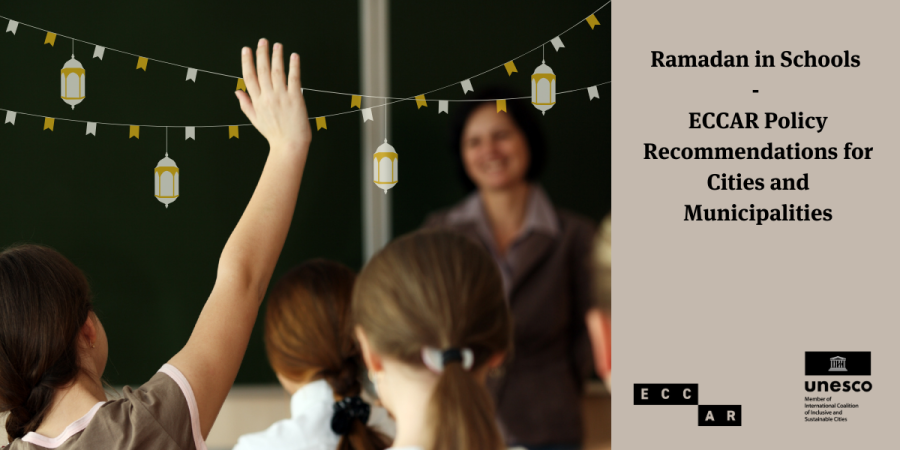
Ramadan offers an opportunity to celebrate cultural diversity in schools, providing an enriching experience for pupils, teachers, and other staff. For non-Muslim pupils and staff, Ramadan can be a valuable opportunity to learn about and participate in their school community's diverse cultures and traditions. Some of the pupils might want to observe the fast. For many others, Ramadan presents a joyful and significant time of the year during which their cultural traditions are in the spotlight, from decorating their houses for the month to enjoying specific foods for the iftar-dinner. Understanding the significance of fasting as a spiritual experience and the cultural traditions connected to Ramadan of diverse communities fosters greater empathy, respect, and appreciation for others. Schools can become a space of inclusion and learning, where open dialogue and education help bridge cultural gaps and promote mutual understanding.
Even though Ramadan is sometimes framed negatively in public discourse as an obstacle, a burden, and a situation for conflict, schools can foster a more inclusive and harmonious society by embracing it as an opportunity for growth and celebration. Including Ramadan in the school’s yearly planning and making it visible in daily life increases the participation of non-Muslim students in building their literacy around traditions of different faiths. With proper awareness and sensitivity, schools can create an environment where all students feel valued, supported, and equal.
Cities and municipalities can act as democratic institutions, employers and rule-makers and set up policies that facilitate the inclusion and celebration of Ramadan in the educational contexts. Ramadan offers a perfect opportunity for cities and municipalities to implement parts of the ECCAR 10 Point Plan of Action, such as ensuring that city dwellers and better informed, committing to their mandate as equal opportunities employer and service provider, challenging racism and discrimination through education, promoting cultural diversity and finally supporting or establish mechanisms for dealing with conflict management. Educators and others working in municipal education institutions should approach Ramadan and further religious events such as Christmas, Eastern, Hanukkah, etc. as part of the religious and cultural diversity of the city’s and its citizens’ everyday life. In a postmigrant society, schools should foster a culture of respect for all religious and cultural observances.
ECCAR has formulated policy recommendations and possible actions cities and municipalities can undertake in addressing the topic of Ramadan within municipal educational institutions:
Ensure respect and sensitivity towards religious practices:
- Creating an inclusive and supportive school environment by recognizing Ramadan as a significant religious practice, culturally relevant tradition and an experience of personal growth
- Making an effort to minimise misinformation spread amongst non-Muslim pupils and school staff about Ramadan as a disruptive factor to school life
- Avoiding framing Ramadan as an obstacle and instead focus on accommodating the pupils’ needs in a supportive manner.
Safeguard the principle of non-discrimination and equal treatment
- Respecting the privacy of those pupils who are and are not fasting, without educators making public announcements or singling out students, except the pupils want to talk about it.
- Creating a supportive environment where students feel comfortable without their religious practices being a source of attention or challenge.
Cooperate with religious communities to foster an open dialogue and to promote religious literacy:
- Facilitating events and roundtables, which lead to a common agreement between the schools and the parents on the expectations from both sides. Questions regarding the theological underpinnings of Ramadan, but also the wellbeing and performance of pupils should be clarified.
- Ensuring the freedom of religion in upholding prayer times and religious observances during school hours. During Ramadan, Muslim pupils may wish to increase their religious observances.
- Allowing flexible arrangements to accommodate pupils’ religious observances, such as providing designated prayer spaces during school hours.
- Educating staff and pupils about Ramadan and fasting students' needs to minimise the potential for discrimination, misunderstanding, or conflict.
Encourage participatory processes and events promoting intercultural dialogue:
- Organising communal fast-breaking (Iftar) events at school for students, teachers, and staff, including those who are not fasting. This promotes inclusivity and a sense of community. Participation should be voluntary and done in a non-coercive manner, helping foster mutual respect and understanding.
- Encouraging and supporting student-led initiatives promoting Ramadan awareness. Recognising and validating these efforts fosters pride in one’s culture and identity and increases solidarity and empathy amongst the school community.
- Encouraging cultural events, such as presentations or exhibitions on Ramadan, that help all students and staff better understand Muslim customs, practices, and traditions.
Anchor the acknowledgement of religious diversity in official instruments such as annual school plans:
- Ensuring that all schools incorporate Ramadan along with other important religious observances into their annual planning for academic schedules and events
- Recognising that Ramadan shifts approximately 10 days earlier each year and that the fasting duration changes with the seasons, being shorter in winter and longer in summer. School schedules should account for these variations, particularly in relation to prayer times and the timing of fasting (from dawn until dusk, including Maghrib).
- Fostering an inclusive and supportive educational environment, and supporting Muslim pupils’ religious freedom and right to participate in the celebration of Eid-al-Fitr (the holiday after the fasting) without academic obligations.
